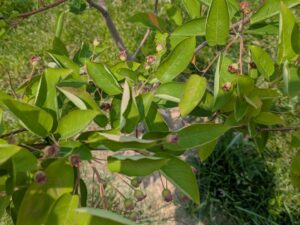Lessons From the Serviceberry

“All Flourishing Is Mutual”
Over three weeks, a vibrant and diverse group from across Canada and beyond gathered virtually each Tuesday to explore The Serviceberry: Abundance and Reciprocity in the Natural World by Robin Wall Kimmerer. This book study was held in tandem with the Canadian ecumenical Jubilee campaign, entitled, Jubilee 2025: Turn Debt into Hope, whose themes of justice, restoration, and balance resonate deeply with Kimmerer’s insights. Each session featured an Indigenous guest speaker and offered a unique lens through which to engage with the text.
Our first session welcomed Sabrina Shawana, co-founder and lead facilitator of Strong Water Singers—an Indigenous women’s collective from the Niagara Region that gathers weekly for wellness and connection. A ten-time award-winning group, they share their Spirit medicine with humanity and for Creation. Sabrina, emerging from a personal season of rest and reflection, shared how this time of inward focus allowed her to nurture the fertile ground from which her future work would grow. Her story beautifully echoed the Jubilee principle of letting the land lie fallow—a sacred pause that allows for renewal.
We reflected on the nature of “Kairos” time—those opportune, sacred moments when transformation becomes possible. Just as the flowering of the serviceberry once signaled to traveling preachers that mountain passes were clear of snow, we are invited to notice the signs of change and readiness in our own lives. Everything in creation is connected. Everything belongs to the Creator. Our task as humans is to love—and that love includes kinship with all of creation: the sky, the earth, the waters, the plants, the four-leggeds, the two-leggeds, the crawlers, the flyers, the swimmers. With kinship comes responsibility: to care for, protect, and live in right relationship with the world around us.
This session naturally flowed into our second gathering, which focused on ecotheology and ecological debt—core themes for us at KAIROS during this Jubilee. We were joined by Bryanna Brown, founder of the Land Back Movement, who shared her deeply personal and powerful story. She spoke about the devastating impacts of resource extraction, including the emergence of man camps and their connection to the crisis of Missing and Murdered Indigenous Women, Girls, and 2-Spirit Peoples (MMIWG2S+). Her testimony was a sobering reminder that ecological harm is never isolated—it reverberates through communities, cultures, and generations.
This deepened our understanding of Kimmerer’s teachings on the interconnectedness of all life. Just as trees communicate through underground mycorrhizal networks—warning each other of danger, sharing nutrients, and supporting the vulnerable—so too must we recognize our responsibility to one another. When one part of the web is harmed, the whole is affected. Bryanna’s story illustrated this truth in human terms: the exploitation of land is inseparable from the exploitation of people. Healing, then, must be collective. It must be rooted in reciprocity, justice, and care.
Our final session brought us into the realm of social enterprise and reconciliation. We were joined by author Shaun Loney and Elder Darcy Wood, former chief of Garden Hill First Nation. Together, they shared the story of Aki Energy and Aki Foods—innovative, Indigenous-led social enterprises that bring clean energy, food sovereignty, and economic opportunity to remote communities. “Aki,” meaning “land” or “earth” in Oji-Cree, is at the heart of their work.
Through their efforts, green energy projects have provided training, jobs, and hope in communities where energy costs were once unaffordable. Aki Foods has helped reintroduce gardening to Garden Hill First Nation, promoting healthier eating and reducing diabetes rates. These initiatives are not charity—they are models of empowerment, rooted in relationships and reciprocity. They show what’s possible when communities are given the tools to lead their own renewal.
For visual learners, diagrams from Social Enterprise Ontario and 4 Lenses illustrate how social enterprises operate at the intersection of mission and market. These models echo the serviceberry’s gift economy—where abundance is shared, not hoarded, and where relationships, not transactions, are the currency of community.

https://seontario.org/social-enterprise-in-ontario/ / https://www.4lenses.org/book/export/html/81/
Conclusion
This webinar series was more than a book study—it was a gathering of hearts and minds committed to reimagining our relationship with the Earth and each other. Through the wisdom of Indigenous voices, the teachings of Robin Wall Kimmerer, and the spirit of Jubilee, we were reminded that abundance is not found in accumulation, but in reciprocity.
Imagine a world where we share what we grow, mend what we have, and care for one another with generosity and grace. A world where “paying it forward” isn’t a trend, but a way of life. May we continue to walk gently, give generously, and live in kinship with all of creation.
By Caroline Sharp. Caroline coordinated and led the webinar book study on The Serviceberry as KAIROS Blanket Exercise Admin Associate.
